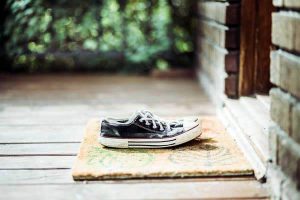Is the Virus on My Clothes? My Shoes? My Hair? My Newspaper?
Many people are fearful about bringing the virus into their homes if they have left their house. These are the most common questions asked. Here’s my take on the subject based on experts’ (infectious diseases experts, aerosol scientists and microbiologists) opinions. Their answers are reassuring.
Should I change my clothes and shower when I return home?
If you are practicing physical distancing and only making occasional essential trips, the experts agree that it’s not necessary to change your clothes or shower when you return home. You should always wash your hands, though. While it’s true that aerosoled droplets from a sneeze can travel 10-20 feet, most fall to the ground. Smaller particles may float in the air for up to 30 minutes, but they are not alive like midges that swarm around you. If you are in the supermarket and someone sneezes directly on you, it may be prudent to go home, change and shower. But generally, that is unnecessary.
Is there a risk that the virus could survive in my hair?
For the same reasons as mentioned above, you need not be worried about viral contamination of your hair if you are staying a safe distance from others. It is highly unlikely to become infected from virus landing on your hair. First, you would have to have sufficient quantity of virus in your hair, then you would have to touch it and then touch your face. This is another reason wearing a mask in public is a good idea.
Do I have to separate clothes before washing? How long can the virus survive on clothing?
Routine laundry should not be a problem as the soap and hot water will kill the virus. The novel corona virus will dehydrate and decay faster on fabric than hard surfaces. It is generally believed that the virus can survive on hard surface about 3 days and about 24 hours on fabric.
Should I be concerned about handling the mail, packages or the newspaper?
At this point there are no documented cases of someone getting sick from handling the mail or packages or reading a newspaper. But that doesn’t mean you shouldn’t be cautious. When in doubt, wipe down these items with a disinfectant wipe or simply leave them set aside for 24 hours.
What about bringing in the virus from my shoes?
 Although there are bacteria and viruses on your shoes, they are an unlikely source of infection. So, what should you do with your shoes? If they are washable, you can launder them. But don’t waste your precious disinfectant wipes on the shoes as it brings those germs that would stay on the soles of your shoes or the ground directly to your hands.
Although there are bacteria and viruses on your shoes, they are an unlikely source of infection. So, what should you do with your shoes? If they are washable, you can launder them. But don’t waste your precious disinfectant wipes on the shoes as it brings those germs that would stay on the soles of your shoes or the ground directly to your hands.
After thinking about what could be on the bottom of our shoes, we started removing our shoes before walking around the house. That seems to be the safest bet. You never know what you stepped in!
I hope these answers were reassuring and help to be safe.
Dr. Bill Rice has been in practice since 1977, as an acupuncturist, chiropractor, and nutritional consultant. He currently practices in Palm Beach Gardens.
For more information, call Dr. Bill Rice at: 561.439.6644 or email drbill@writeme.com
